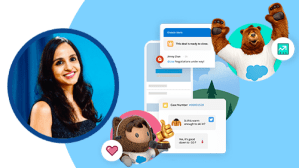Running and growing a business requires your focus on a lot of different things. You have to hire the right people, make sure you’re managing cash in and cash out, and ensuring you’re providing the right product or service to your customers.
The problem with this is that we tend to forget the one thing that drives growth is customers. Without customers, there is no business.
So, for small and medium-sized businesses (SMBs) to succeed today, leadership must be laser-focused on transforming the customer’s experience for the better.
But our world has changed. We are dealing with new channels, skills, regulations, stakeholders, and expectations. This is making it harder than ever to connect with our customers.
This isn’t just a new chapter for business. It requires a whole new playbook built around:
- Enhancing sales productivity throughout the pipeline to drive faster sales.
- Retaining customers and building loyalty with end-to-end visibility.
- Enabling seamless collaboration across your entire business.
Cross-team alignment delivers connected customer experiences
To achieve those three critical goals, SMBs need better cross-team connections to deliver more personalised customer experiences. A truly connected experience requires you to break down the walls between sales, service, and marketing.
When departments work together, it creates a circle of success that delivers the connected experiences that drive customer lifetime value, satisfaction, and retention. It also improves process efficiency, and boosts sales and service productivity to increase cost effectiveness.
To make that possible, you need one customer command centre that connects departments with shared access to a 360-degree customer view on a single, scalable platform.
This allows the marketing team to leverage service data to find and focus on more high-value customers. They will also know of a customer’s recent service enquiries, so they will not reach out with promotions while a customer is experiencing technical issues.
At the same time, your sales team will also be aware of recent purchases on your commerce platform and can tailor their outreach accordingly. And your customer support team can use sales-related data to assist customers in their pre-sales journey, and provide personalised service to drive better conversion and retention.
Increasing customer lifetime value with Customer 360
If you want to increase customer lifetime value, you need to better deliver the connected, personalised experiences customers crave. According to the fifth edition of the Salesforce State of the Connected Customer report, 56% of customers expect all offers to be personalised, and 85% expect consistent interactions across departments.
Customer 360 empowers companies to use a data-driven process to deliver personalised customer experiences. It helps businesses to better understand customers’ individual needs, and therefore level-up personalisation strategies to increase customer lifetime value.
It achieves this by creating a single source of truth for connected customer experiences — across sales, service, marketing, and commerce. So whether customers are meeting you in-person, answering your emails, or chatting on the phone, you have one platform connecting every touchpoint.
That’s how you drive personalisation and deliver consistent customer experiences that are connected across your organisation.
Connection is the secret to customer loyalty
Singapore-based smile cosmetics company, Zenyum, is putting this concept into practice. Zenyum’s success is based largely on the company’s ability to connect with tech-savvy millennials and deliver connected customer experiences that combine digital convenience with deep data-driven personalisation. This has been made possible through Sales Cloud, Service Cloud, and Experience Cloud.
“Having the right information in the right stages is key,” says Chief Product Officer at Zenyum, Anupama Hoon. “Now we follow a single sales dashboard to track the metrics for the company. We have a clear overview of the sales funnel, and the data is available in real-time.”
Data-driven selling has a strong competitive advantage over intuitive selling. Data-driven organisations are 23 times more likely to acquire customers compared to their competition, and nine times more likely to surpass them in customer loyalty.
Zenyum’s success underlines the point that disconnected systems lead to unreliable data, reduced productivity and unknown customer needs. But with the use of technology, SMBs can adapt to evolving customer needs, build meaningful connections, and accelerate growth.
Want to learn more?
Watch the on-demand webinar about increasing sales productivity and creating connected customer experiences.




























